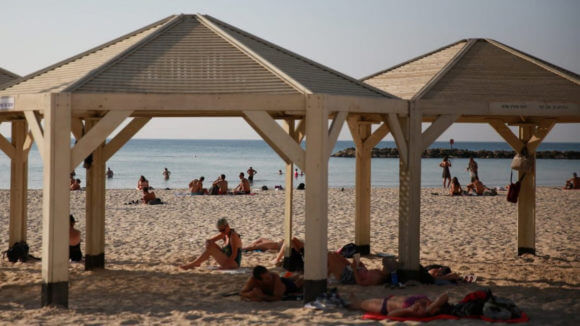As Israel escalated its structural oppression of Gaza through renewed military attacks this week, the Israeli military has killed at least 34 Palestinians, and exterminated a complete family. Following traditional patterns, these actions have been rationalized and euphemized throughout Western media, which tended to center the discourse on Israel’s fears.
The BBC has perfectly exemplified this phenomenon, when it labeled Israel’s attacks as “retaliatory strikes.” It further reported that 63 people in Israel “have been treated for injuries and stress symptoms,” highlighting that “[a]n elderly woman was slightly wounded by broken glass after a rocket hit a house in the southern Israeli city of Ashkelon.” Israeli paper Haaretz wrote that four Israelis were treated for anxiety.
You can’t make this up. pic.twitter.com/9CiwDhYk6l
— Imraan Siddiqi (@imraansiddiqi) November 13, 2019
Reactions from the U.S. Political Elite
U.S. politicians echoed the centrality of anxiety. This latest episode reiterated that every major U.S. lawmaker and presidential contender would work towards shielding Israel from both significant criticism and Palestinian resistance.
Bernie Sanders tweeted:
“Israelis should not have to live in fear of rocket fire. Palestinians should not have to live under occupation and blockade. The U.S. must lead the effort to end the crisis in Gaza and the persistent violence that threatens everyone.”
While, within the United States, Sanders’ views on Palestine are oftentimes considered more progressive in relation to the political spectrum in that country, Sanders’ criticism of Israel has always been limited to the framework of an unbreakable U.S.-Israeli bond. Applying the same rhetoric, Joe Biden, known for his unapologetic support for Israel, tweeted:
“Israel has a right to defend itself against terrorist threats. It is intolerable that Israeli civilians live their lives under the constant fear of rocket attacks. That’s why our administration was such a strong supporter of Israel’s life-saving Iron Dome.”
That Palestinians are not only living in constant fear of rocket fire, but also experiencing structural violence of genocidal dimensions, is not acknowledged. In fact, the daily struggle for survival of Palestinians in Gaza in the face of a brutal Israeli siege by land, water, and air, rarely makes any headlines. When Palestinian responses disturb Israeli comfort, U.S. media and politicians do get vocal – mostly to proclaim solidarity with the occupying power.
Opposing Realities
Indeed, daily life seemed slightly disrupted in Israel. An article in Haaretz, titled “No Casualties but Plenty of Confused Tourists in Tel Aviv,” soberly depicts how unusual that particular day was experienced in Tel Aviv.
“A stroll through the streets of central of Tel Aviv early Tuesday morning revealed that this was clearly not a normal workday. Traffic was not as heavy as usual; the number of commuters passing through the turnstiles at the Hashalom train station — a major public transportation hub — was unusually low for this time of day; and there was none of the usual hustle-bustle in the streets.”
The reader further learns that a major street was so quite, “it felt almost like Shabbat,” that there were no bicycles in sight on Tuesday morning, that a security guard looked bored and that the beach was relatively empty. While “famous cafés and restaurants were open,” “business seemed to be slower than usual for the time of day.” As a result, some tourists were confused. All of this happened because the “locals” were “[a]pparently at home, glued to the news.”
Compared to the disastrous living conditions in Gaza, these inconveniences in Tel Aviv appear as a temporary, limited contestation of the Western privilege that Israel enjoys in the region.
Settler-Colonial Fear
Beyond the constant evocation of Israeli fear as a way of rationalizing state violence, fear needs to be understood as a structure that underlies the relationship between the settler-colonial state and the indigenous population.
As Deborah Bird Rose theorized, the native gets in the way of the colonizer by merely staying at home. Hence, indigenous people are prone to being criminalized under the settler rule for continuing to exist on their own land. While early Zionists, who have openly used the language of colonialism, had various views regarding the population of Palestine, some did identify Palestinian resistance early on as the fundamental obstacle to the colonial project.
Prominent militant Zionist Ze’ev Jabotinsky wrote in 1923 that “[t]he native populations … have stubbornly resisted the colonists,” and that “[e]very native population in the world resists colonists as long as it has the slightest hope of being able to rid itself of the danger of being colonised.” As Mahmoud Darwish expressed poetically, “hope” is an incurable malady for Palestinians, who are hoping for liberation, independence, and a normal life. Jabotinsky understood early on that resisting “is what the Arabs in Palestine are doing, and what they will persist in doing as long as there remains a solitary spark of hope that they will be able to prevent the transformation of ‘Palestine’ into the ‘Land of Israel.’”
As a consequence of these fears, almost a century ago, Jabotinsky advocated for an “iron wall” that would separate the incoming settler-community from the present Arab inhabitants. Like Jabotinsky, many Zionist leaders, including Theodor Herzl, realized that the colony without metropole could only survive through a perpetual alignment with strong Western powers. The conceptualization of Israel as a European outpost has consistently been reiterated, for example, by Netanyahu.
Palestinian Resistance
While Israel managed to ethnically cleanse much of the land in the 1948, Palestinians continue to survive on their land and to resist the continuous violence that Israel subjugates them to. In fact, the mere existence and survival of Palestinians is a constant source of fear for an ethnocratic state, which thrives on colonial expansion and racist subjugation.
Palestinian resistance efforts need to be viewed within the context of the right to resist, which is enshrined in several UN documents. Resolution 37/43 from December 1982, for example, which was passed following Israel’s brutal invasion of Lebanon that entailed the Sabra and Shatila massacre, scrutinizes Israel’s “denial of the inalienable rights of the Palestinian people to self-determination, sovereignty, independence and return to Palestine and the repeated acts of aggression by Israel against the peoples of the region” as “a serious threat to international peace and security.” The resolution stresses “the legitimacy of the struggle of peoples for independence, territorial integrity, national unity and liberation from colonial and foreign domination and foreign occupation by all available means, including armed struggle.”
Fear and “Terrorism”
As long as Palestinians resist, there will be Israeli anxiety. Israeli rhetoric has changed throughout time. Today, it focuses on Hamas and Islamic Jihad, which came into existence over a century after the emergence of settler-colonial Zionism. Regardless of how resistance against Israel is organized, Israel and its Western allies can easily discursively criminalize every Palestinian, alive or dead, into individual “terrorists” or members of a “terrorist organization” in order to turn them into existential threats and justify their killing.
The fear of the native is visible in the reproduction of ever-new methods of containment and control of Palestinians, from apartheid laws, segregation walls, and military control, to bombardments. Fear will continue to define Israel’s approach to Palestinians.



As long as his victims resist, there will be rapist anxiety. The only thing the rapist can do is continue to kidnap, imprison and rape.
To expect him to do anything else – liberate his victims, turn himself in to the authorities, accept responsibility and accountability for his past and on-going crimes and, hopefully, reform – is to “single out” the rapist and deny him his “right” to “self-determine” himself in women.
Rapists – like Zionists – are truly hateful and immoral people.
“…Jabotinsky advocated for an “iron wall” that would separate the incoming settler-community from the present Arab inhabitants.”
According to Ian Lustick’s new book “Paradigm Lost: From Two-State Solution to One-State Reality” Jabotinsky actually envisioned the “Iron Wall” strategy as a way of showing the Palestinians that the Jews were there to stay, and once it became clear that they accepted that he believed that there would be equal rights between the Jewish and Palestinian inhabitants of the region. But what happened instead, in Lustick’s telling, is that Israel became drunk with victory after the ’67 war, and any notion of living as equals went out the window.
RE: “As long as Palestinians resist, there will be Israeli anxiety. Israeli rhetoric has changed throughout time. Today, it focuses on Hamas and Islamic Jihad . . .” ~ Denijal Jegić
SEE: “How Israel Helped to Spawn Hamas” | By Andrew Higgins | The Wall Street Journal | Jan 24, 2009
ENTIRE ARTICLE – https://web.archive.org/web/20090208223439/http://online.wsj.com/article/SB123275572295011847.html
“Israelis should not have to live in fear…”
I thought Israel was the place where Jews needn’t live in fear and would be safe from those awful anti-Semites.
I think it was June 2014 – just before one of the worst assaults on Gaza – that a man passing by our weekly vigil in front of the Israeli consulate in Toronto asked, “What is life like for Jewish Israelis?”
I said, “They’re fine. They go to the beach, they go to the mall, they go to work, they go to school. The occupation doesn’t touch them.”
Superficially, that’s true. Profoundly, it isn’t. It does touch them. But you know what? I’m not going to waste pity on them.